The peak body representing Australia’s tertiary institutions, Universities Australia, has confirmed that the National Student Safety Survey (NSSS) will be conducted in 2024 across universities nationwide despite initial uncertainty.
The NSSS study is conducted every three years to evaluate sexual harm in Universities and was in doubt for 2024 since the apex body was unable to guarantee funds.
In a statement Universities Australia chairman Professor David Lloyd, said while much is being done in this domain, much more is required of us collectively.
“There was an agreement across the membership that individual universities have strong understandings of their own unique demographics, campuses and students, which is why they are best placed to continue building on the extensive work undertaken to date,” Professor Lloyd said.
“We recognise that one-size-fits-all intervention strategies do not translate to broad benefit in this most difficult of domains. We are committed to revisiting and advancing an appropriately redesigned survey, to be rolled out in 2024.”
Universities Australia previously conducted the NSSS in 2021 which was funded by the Respect.Now.Always initiative and published a report in March 2022.
Findings revealed that 275 students were assaulted weekly, along with one in six students facing sexual harassment and, one in twenty experiencing sexual assault during their time at Australian Universities.
However, the report drew criticism for being conducted during the COVID lockdowns when student presence on campuses was low. Many voiced concerns that the actual figures could be significantly higher and called for the responsible body to conduct a new survey right away.
Founder of End Rape on Campus (EROC), Sharna Bremner said in an interview with the ABC News, that universities’ appear unconcerned over the issue so the external interference is required.
“What we see within the University sector is as self-regulating institutions, a lack of independence in oversight, and it’s become very, very apparent that without external oversight and accountability, universities are just not willing to actually take the steps necessary for meaningful change,” Ms Bremner said.
Education Minister Jason Clare, meantime, criticised the education sector for its incompetency in addressing campus violence and failing to implement effective measures to combat it.
“The actions universities have taken to address sexual assault and harassment on campuses to date have not been good enough,” he said.
“We have the research. We have the evidence. We have to act. It is clear that university governing bodies must do more.”
The University of Wollongong, last week, released its annual report on sexual harm and prevention that revealed a staggering 700 per cent surge in sexual assault and harassment cases within and around the university in 2022. In this video, UOW students expresses their thoughts on this substantial increase and share their ideas of what university can do to reduce such cases in the coming year.

